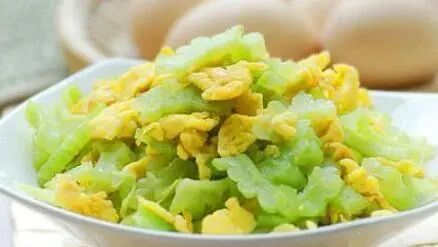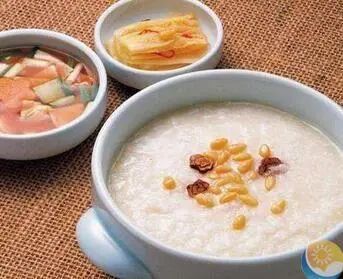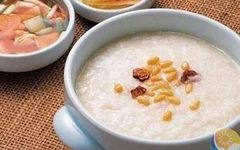Health Recipes
1. Recommended Summer Health Recipe: Bitter Melon Stir-Fried Eggs
Ingredients: Bitter melon (kǔguā), eggs (jīdàn), salt (yán).
Method: Clean the bitter melon, cut it open, remove the pulp and seeds, then finely chop the prepared bitter melon and place it in a container. Beat in the eggs and mix with an appropriate amount of salt. Heat oil in a wok, pour in the bitter melon and egg mixture, and stir-fry until cooked.
Effects: The alkaloids contained in bitter melon have pharmacological effects such as clearing heat, promoting blood circulation, and dilating blood vessels.

2. Recommended Summer Health Recipe: Red Bean and Sago Dessert
Ingredients: Red beans (hóngdòu) 450g, sago (xīmǐ) 100g, sugar (táng) 240g, coconut milk (yējiāng) 1/2 cup.
Method: Soak the sago for 30 minutes, then cook in hot water over low heat until transparent, rinse in cold water for 15 minutes, and drain. Clean the red beans, add an appropriate amount of water, and steam in a steamer for about 40 minutes. In a pot, add sugar and an appropriate amount of water, boil until the sugar dissolves, add the red beans and cook for 10 minutes, then add the sago and cook for another 5 minutes. Refrigerate, and when serving, mix in the coconut milk.
Effects: Red beans have diuretic, anti-swelling, and detoxifying effects, while sago helps restore the skin’s natural moisture. This dessert can clear heat, detoxify, quench thirst, promote diuresis, beautify the skin, and whiten the complexion.
3. Recommended Summer Health Recipe: Job’s Tears and Tangerine Peel Porridge
Ingredients: Job’s tears (yìyǐrén) 50g, Solomon’s seal (yùzhú) 10g, tangerine peel (júpí) 5g, jujube (dàzǎo) 10 pieces, japonica rice (jīngmǐ) 200g.
Method: Place the job’s tears, Solomon’s seal, tangerine peel, and washed japonica rice in a pot, add an appropriate amount of water, bring to a boil over high heat, then simmer on low heat until the rice is soft and the porridge is thick.
Effects: This porridge has the effects of clearing heat, dispelling dampness, strengthening the spleen, benefiting qi, and generating fluids.

4. Recommended Summer Health Recipe: Papaya and Snow Fungus Soup
Ingredients: Snow fungus (xuě’ěr) 15g, papaya (mùguā) 200g, rock sugar (bīngtáng) to taste.
Method: Soak the snow fungus in clean water until soft, then clean it. Prepare the papaya and rock sugar (using half a papaya). Peel the papaya, remove the seeds, and cut it into small pieces. Boil the snow fungus in cold water, cover, and cook on high heat until boiling, then reduce to low heat for one hour. After one hour, add the rock sugar and simmer for another half hour.
Effects: Snow fungus has the effects of tonifying the spleen and appetizing, benefiting qi, clearing the intestines, and nourishing the lungs. It is rich in natural plant-based gelatin and has nourishing properties, making it a good skin-care food when combined with papaya for enhanced nutrition.
Summer Health
Summer is the season of the most vigorous yang energy, with hot weather. This is a period of metabolism, where yang energy is expressed outward, and the yin is hidden within, leading to vigorous circulation of qi and blood, active on the body’s surface. In summer, it is important to focus on mental health, maintaining a cheerful mood, and avoiding extreme emotions to prevent exacerbating heat. A calm heart cools the body, achieving the goal of health preservation.
Summer Dietary Health
1. Eat more melons: Summer is particularly hot, and the body loses a lot of water, which needs to be replenished promptly. Melon vegetables contain over 90% water. All melons have the effect of lowering blood pressure and protecting blood vessels.
2. Eat more cooling vegetables: Cooling vegetables help generate fluids, quench thirst, relieve heat, and detoxify. Pumpkins (which are warm in nature) and others like bitter melon, loofah, cucumber, wax gourd, watermelon, and cantaloupe are all cooling.
3. Eat more “antibacterial” vegetables: Summer is a peak season for intestinal infectious diseases. Eating these vegetables can help prevent intestinal diseases. These include garlic (dàsuàn), onions (yángcōng), leeks (jiǔcài), and scallions (dàcōng). These allium vegetables contain rich plant-based broad-spectrum antibacterial substances that can kill and inhibit various cocci, bacilli, fungi, and viruses. Among them, garlic is the most effective and is best eaten raw.
4. Timely replenish vitamins by eating fresh fruits and vegetables such as tomatoes, green peppers, winter melon, watermelon, bayberries, cantaloupe, peaches, and pears.
5. Replenish water and inorganic salts, especially potassium, which can be found in legumes or soy products, fruits, and vegetables. Eating more foods that clear heat and dispel dampness, such as watermelon, bitter melon, peaches, black plums, strawberries, and cucumbers, can help cool the body.
6. Moderately replenish protein, with fish, lean meat, eggs, milk, and legumes being the best sources of high-quality protein.
Summer Health and Sleep
1. Keep the bedding clean.
In hot summer, bacteria can easily grow. Keeping the bedding tidy not only provides a good sleeping environment but also ensures quality sleep.
2. Pay attention to the temperature and humidity of the bedroom.
The ideal temperature is 20-23°C, and humidity should be 50%-70%. Below 20°C can make one feel cold, while above 23°C can make one feel hot, leading to difficulty sleeping. Good ventilation in the bedroom is also essential.
3. Choose suitable pillows and cooling mats.
Pillows and cooling mats significantly affect sleep quality. The bed and quilt should have appropriate firmness. The height of the pillow should not be too high, and using cotton pillows in hot summer can cause heat rash on the neck. If the pillow gets wet with sweat and is not cleaned and dried promptly, it can lead to unpleasant odors that disturb sleep.
Nap
For those who have trouble sleeping at night, a timely nap can serve as a supplement. However, the nap should ideally last about one hour and not be too long, as excessive napping can lead to grogginess.
Summer Health and Exercise
1. Morning exercise should not be too early to avoid affecting sleep.
2. The body consumes a lot of energy in summer, so it is important to manage exercise intensity.
3. After exercising, avoid cold drinks. Some people have a habit of drinking iced beverages after exercise. Consuming cold drinks when the body temperature is high can harm the stomach. Warm saline water is the best drink after exercise.

